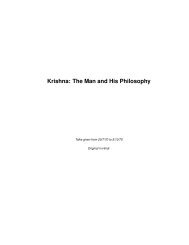Hyakujo: The Everest of Zen, with Basho's Haikus - Oshorajneesh.com
Hyakujo: The Everest of Zen, with Basho's Haikus - Oshorajneesh.com
Hyakujo: The Everest of Zen, with Basho's Haikus - Oshorajneesh.com
Create successful ePaper yourself
Turn your PDF publications into a flip-book with our unique Google optimized e-Paper software.
CHAPTER 6. THE DISCIPLE IS THE SEEDAll the religions have been action oriented. Don’t do this, don’t do that – they are all <strong>com</strong>mandments.<strong>The</strong> question is not <strong>of</strong> your doing, the question is <strong>of</strong> your being. Be in a conscious state, then dowhatever <strong>com</strong>es out <strong>of</strong> your spontaneity – and it is right. If it does not <strong>com</strong>e as a spontaneousconscious response, then even if the whole world says it is good, it is not good. <strong>The</strong> ultimatecriterion is not the action. <strong>The</strong> ultimate criterion is the origin.<strong>The</strong> mind is capable <strong>of</strong> doing both. It can be a slave, as it is to millions <strong>of</strong> people. Very rarely is themind <strong>com</strong>pletely free from objects, desires, anger, and just a simple empty space, no-mind.So we can say it in this way: if you act through mind, it is wrong; if you act through no-mind, it isright.A haiku by Basho:BIRTH OF ART –SONG OF RICE PLANTERS,CHORUS FROM NOWHERE.If you are utterly silent, then everything that happens in that silence, takes a new color. It be<strong>com</strong>esthe birth <strong>of</strong> very art. ”Song <strong>of</strong> rice planters” – it is not much <strong>of</strong> a music. Poor rice planters, justto keep them engaged, they are singing in chorus. But a man <strong>of</strong> silence, immediately makes orgives a glamor to the ordinary stones. ”Song <strong>of</strong> rice planters, chorus from nowhere.” As far as he isconcerned he is utterly silent, so he wonders from where this chorus is <strong>com</strong>ing. <strong>The</strong> whole existencehas be<strong>com</strong>e a chorus, a beautiful symphony. Our lives can be lived as music, as poetry, as art... asmystics. Those are the right ways to live our lives. Right, because to live those styles, you will haveto find your origin first.Question 1Maneesha has asked:BELOVED OSHO,WHAT IS THE URGE TO UNDERSTAND?Maneesha, the urge to understand <strong>com</strong>es from your very nature. <strong>The</strong> mystery <strong>of</strong> existence wantsyou to be<strong>com</strong>e a shareholder. <strong>The</strong> mystery <strong>of</strong> existence does not want you to stand outside, but to<strong>com</strong>e inside the temple. It is too hot outside, it is perfectly cool inside.<strong>The</strong> urge to understand is absolutely a part <strong>of</strong> intelligence. Intelligence wants to know, who is there<strong>with</strong>in me; from where <strong>com</strong>es my love, my tears, my laughter? One does not want to remain ignorant<strong>of</strong> his own house.<strong>The</strong> urge to understand is the only hope for man. If there is no urge to understand, there will not beany mysticism, and there will not be any poetry; there will not be any music, there will not be any<strong>Hyakujo</strong>: <strong>The</strong> <strong>Everest</strong> <strong>of</strong> <strong>Zen</strong>, <strong>with</strong> Basho’s <strong>Haikus</strong> 94 Osho
















